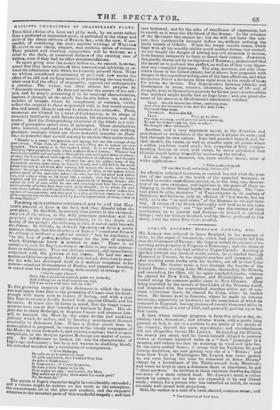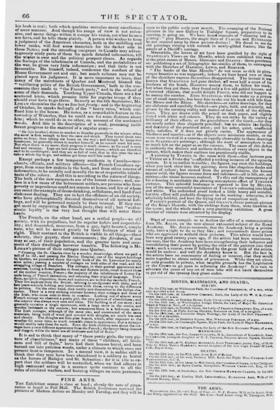LOGAN'S JOURNEY THROUGH CANADA, ETC.
MR. LOGAN was induced to leave Scotland, in the summer of 1836, by the organ of locomotion, which had previously led him over the Continent of Europe; the hope or rather the chance of re- covering some property in Virginia or Tennessee; and t he desire of visiting a brother, who had settled in Upper Canada. Arriving at Quebec without any incident worth notice, he pruceedecl through Montreal to Toronto, by the regular coaches and steamers ; and, after residing some weeks with his brother, set off to visit Lake Superior. He thence made a tour through the frontier of the United States; crossing Lake Michigan, descending the Illinois, and ascending the Ohio, till he again reached Canada; whence he started for New York, Boston, and Philadelphia, and pro- ceeded along the common public route to New Orleans. After being horrified by the morals of that Cadiz of the Western world, and disgusted with the unpunished murders which are of con- stant occurrence there, be steered fur Cuba, where he landed twice. He thence went to Jamaica, where he made an interior excursion, apparently on business; on the completion of which he returned to England; having journeyed twenty thousand miles in thirteen months, at a cost of 3501., and generally putting up at the first hotels.
A man whose average progress is forty-five miles a day, in- cluding visits, detentions, and adverse winds, with a pretty long journey on foot, is not in a position to see much of the people or tint country, beyond the mere superficials; and circumstances did not altogether favour Mr. LOGAN. Descending the Illinois, his money ran short, and lie found himself obliged to journey twelve ur thirteen hundred miles as a " deck" passenger in a steamer, and reduce his fare by assisting to wood and lade her. In the more settled States, it seems that the Yankees, for good reasons doubtless, are now getting very shy of a " Briton ;" and from New York to Washington Mr. LOGAN was never spoken to, not even during the time he remained at Astor House! except by a Lieutenant of the Thirty-second from Montreal ; and when he tried to open a discourse there or elsewhere, he got " short answers." In addition to these extrinsic drawbacks, there are some of a more inward kind. Mr. LOGAN'S mind is rather narrow by nature, and lie has not expanded it by any liberal study ; whilst, for a person who has travelled so much, he seems tolerably well stored with prejudices. Still, the author is a man of a hard, shrewd, common sense; and • The Clarendon of New York. his book is real ; both which qualities outvalue many excellences of mere manner. And though his range of view is not exten- sive, and many things within it escape his vision, yet what he sees are facts, and he tells them plainly. A person who wishes to form a judgment of the American character, both in the middling and lower ranks, will find loins materials for the darker side in these Notes; and the intending emigrant to Canada may advan- tageously study parts of them for much detailed information, till the winter is over and the political prospect clears. As regards the feelings of the inhabitants of Canada, and the probabilities of the war, he gives very little information ; and that little is not favourable. He himself, indeed, condemns the conduct of the Home Government out and out; but much reliance may not be placed upon his judgment. It is more important to learn, that many of the merchants of Quebec and Montreal blamed the 1" vacillating policy of the British Government," both in the con- cessions they made to "the French party," and in the refusal of some of their demands. Touching Upper Canada, there are a few scattered hints, which promise little for regular troops if they should ever have to go there. So early as the 6th September, Mr. Loossi chronicles the day as fine but frosty; and in the beginning of October, he speaks feelingly of the " heavy rains," which con- lined him to the house. He notes, as a remarkable feature in the township of Waterloo, that he could see for some distance about him; which he could do in no other, on account of the uncleared woods. And this is the description of a road, promising indif- ferent progress to the materiel of a regular army- 4, He (his brother) drives to market to Hondas generally in the winter, when the snow is firm enough to bear the oxen and sleigh. They travel about two miles an hour, thus taking six hours on the way ; and though he keeps two bondsmen, he generally drives to market himself, as he cannot trust his men. But when there is no snow, their progress is much slower, as the road is very bad and swampy. Logs are laid across the worst places,—which are therefore said to be corduroyed; and they are so full of ruts, that in this state the oxen take a whole day to go, and seldom get home until late next day."
Except perhaps a few temporary residents in Canada—mer- chants, officials, and military officers—the French Canadians ap- pear, from some few indicia in the book, and from other sources of information, to be socially and morally the most respectable inhabi- tants of the colony. And this is according to the nature of things. The bulk of the new emigrants are of the lowest classes; and, un- less in a few cases of the bettermost settlers, are persons who from poverty or imprudence could not remain at home, and few of whom can resist the example of dram-drinking, selfishness, and hard if not dishonest dealing. They are in fact the offshoots of an old society, who have philosophically divested themselves'of all natural feel- ings, and will be governed entirely by their interest. If they can get most by supporting the British party, they will ; but "enthu- siastic loyalty" is the very last thought that will enter their beads.
The French, on the other hand, are a settled people—an old society, with its prejudices, but its regular habits and respectabi- lity; and descended, moreover, from a gay, light-hearted, simple ✓ ace, who will be moved greatly by their feelings of what is right. Their contrast to the British is visible in all things—their sobriety, their gayety, their amusements; the fixedness, if one may so say, of their population, and tho greater taste and orna- ment of their dwellings however humble. The following is Mr. Locares picture of their cottages near Quebec.
"Crossing the St. Charles river by a wooden drawbridge, where we paid a toll of I s. 3d., and passing the Marine Hospital, one of the largest buildings in Quebec, we proceeded down the right bank of the St. Lawrence for nearly sine miles ; passing a number of cottages on both sides of the road, and the straggling village of Beaufort. The cottages, in their general appearance and seatnew, having a flower-garden in front and flowers inside, recall to mind thew of the mother country, France; the majority of the inhabitants of Lower Ca- n ada being of French extraction, and retaining their original language. Their form, sprightly disposition, dress, and manners, are to this day decidedly French. They live separate from the British, refusing to amalgamate with them, and of late years scarcely holding any intercourse with them, owing to the difference in politics. On the other hand, they readily suit themselves to the Indian cha- racter. There is a very striking contrast between their cottages and those of the Irish, who come next to them in number. Looking out of almost every /French cottage we observed a pretty girl, the very picture of cheerfulness ; and the interior was always very neat and clean. The building is of one story ; and generally contains a single apartment, with a large stove in the centre, and wooden bedsteads in the corners; but sometimes there is • bed-room apart. The Irish cottages, although of the same site, and constructed of the same materials, being built of wood and covered with shingles, are much less neat and cleanly. The shingles are thin pile boards, which, after exposure to the weather for some time, so much resemble slates in appearance, that a stranger would readily take them for such. Even the Irish children seen about the cut. Sages have a very different appearance from the French;; the former being denture
sad dogged, while the latter are all liveliness and full of frolic."
It is sad to think that many of " these pretty girls, the very pic- ture of cheerfulness," and many of these " children, all liveli- ness and full of frolic," have had their houses burnt, and been turned out into pathless woods, under a climate to which Wien our present frost is temperate. In a mental view, it is sadder still to think that they may have been abandoned to a soldiery as brutal as the heroes of Badajoz and St. Sebastian : for it is idle to ex- pect that the soldiers will be controlled, when we find officers in high command acting in a manner quite contrary to all the rules of civilized warfare, and burning villages on were pretences.



























 Previous page
Previous page